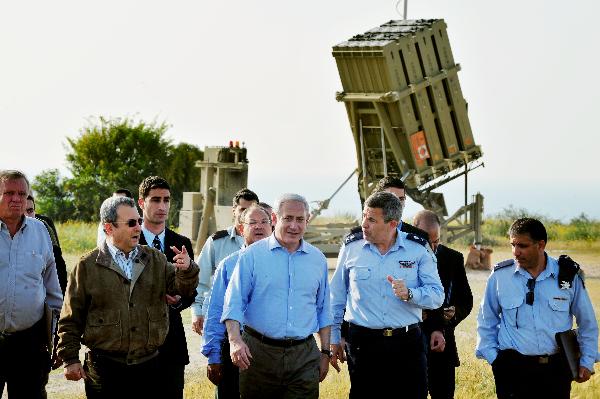Gur Salomon
Jerusalem (Xinhua): The anti-rocket defense system, the Iron Dome, in intercepting projectiles fired by Gaza militants at southern Israel over the weekend may hold strategic implications in regard to threats that Israel faces on other fronts, Israeli military sources say.
One Iron Dome battery, deployed by the Israel Air Force north of the desert city of Beersheva on March 27, knocked down two Grad- type rockets fired by Gazan militants at the city on Friday night.
A second battery, deployed a week later near the coastal city of Ashkelon, intercepted an additional seven rockets since Thursday.
Some top Israeli security officials not until recently cast doubt on the system’s ability to successfully accomplish its purpose, citing the high cost of the “Tamir” interceptor it utilizes, estimated at up to US$40,000 per unit.

All doubts were put aside following the system’s performance under real battle conditions over the weekend, as it intercepted projectiles heading towards residential neighborhoods in Beersheva and Ashkelon, thus preventing an unknown number of fatalities and damage to infrastructure.
“We started on the right foot with a number of successful interceptions. Ultimately, what’s intercepting the rockets is not the system, but the people operating it,” said IAF chief Maj.-Gen. Ido Nechushtan during a visit to the site of a battery on Saturday.
Noting that the system has “made world history,” Nechushtan was also careful to stress that it is still at the preliminary phase, saying that “we have to put things into perspective.”
Israeli Prime Minister Benjamin Netanyahu on Sunday added praise of his own, saying the IDF “has had two major achievements in the past few days, one in the area of defense, the other in offensive operations. In the area of defense, Israel scored a significant and impressive success with Iron Dome.”
The system’s recent success has once again led to calls from within the IAF for the hasty procurement of more Iron Dome batteries. Israeli defense officials estimate that the IAF would need to deploy 13 additional batteries across the country in order to provide sufficient protection from short-range rockets.
On Sunday, Army Radio quoted security officials as saying that the United States is expected to transfer 205 million U.S. dollars in special funding to Israel for the procurement of additional batteries. They could not, however, say exactly when that funding would be received.
Israeli officials said the system’s success, especially in light of the fact that it is still in its infancy, may have far- reaching strategic and psychological implications which are still hard to assess at this point.
Iron Dome is said to hold the potential to eventually become a tie-breaking weapon system in countering Lebanon’s Hezbollah, which Israel says currently possesses 40,000 rockets intended to strike heavily populated areas in northern and central Israel in a future war.
While the system cannot provide full protection, it can greatly minimize the damage. That in itself relieves domestic pressures on Israeli decision-makers to launch a ground offensive against Hamas while having more time to contemplate a military response.
On the downside, some Israeli officials have voiced apprehension that Hamas and other militant groups may exploit Iron Dome’s cost for a “financial wearing down” of the Jewish state — by firing salvos of cellar-manufactured projectiles costing anywhere from hundreds to a few thousand dollars.









